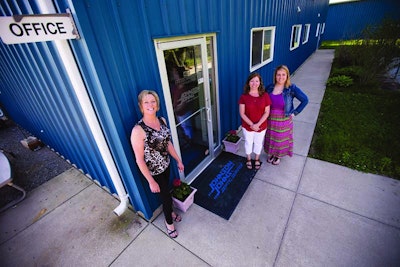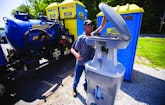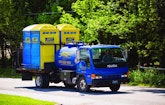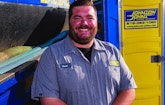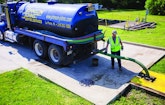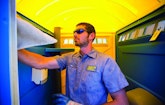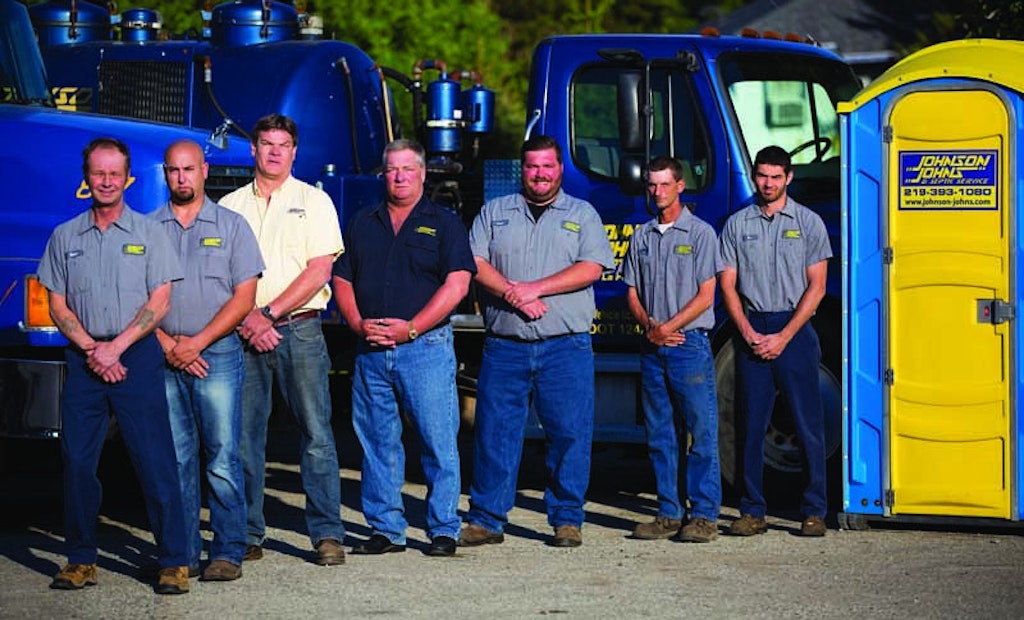
Interested in Industrial?
Get Industrial articles, news and videos right in your inbox! Sign up now.
Industrial + Get AlertsIn 2001, Jeff Johnson started Johnson Johns & Septic Service out of necessity more than anything. A few years prior he had purchased a struggling utility company serving an industrial park in Kingsbury, Indiana. Johnson spent millions upgrading the utility company’s aging wastewater treatment plant and soon realized he needed more flow to get his new endeavor on the road toward profitably. What better way than to provide it himself?
“I saw an opportunity to grow the industrial park and start up some other businesses if there was a strong utility infrastructure and the treatment plant was taken care of properly,” Johnson says. “But in the beginning it wasn’t making much money, so I started up Johnson Johns because I had my own disposal site and obviously I needed the revenue. That’s how it all started.”
Today, Johnson Johns & Septic Service is more than just a means to feed the treatment plant. It’s a successful business all its own, servicing a 50-mile radius around Kingsbury with septic pumping and portable restroom rentals. But the treatment plant has played a key role in that success, as has the company’s emphasis on customer service.
“Quality of service definitely stuck out early on as something that would take us really far,” says Derek Johnson, Jeff’s son, who now co-manages the company’s daily operations.
FROM TRASH TO WASTEWATER
Before Johnson Johns & Septic Service got started, the Johnson family business involved a different type of waste. Lloyd Johnson started a garbage collection company in 1958. When he died 30 years later, the business was passed on to his son, Jeff, who grew it aggressively over the subsequent 10 years. Then Jeff acquired Kingsbury Utility and a 2.5 mgd treatment plant serving an industrial park, and the transition from trash to wastewater soon followed. Within a two-year period, the treatment plant was purchased, the garbage company sold, and Johnson Johns & Septic Service founded.
Since then the business has gradually grown larger, with Derek Johnson now managing the day-to-day operations alongside Ted Knibbs, a longtime family friend. They have remained focused on portable restroom rentals and septic pumping, each service accounting for about half of the overall workload. The service area is a 50-mile radius around the company’s home base in Kingsbury, although Johnson Johns will go farther on occasion to provide and service restrooms at larger special events.
The restroom inventory, including hand-wash stations, numbers 750 (mostly PolyJohn with some Satellite units from an acquisition). Chemicals typically come from Chempace and Walex. The truck fleet includes a 2006 Kenworth T800 from Keith Huber with a 3,600-gallon steel tank and Masport pump; a 2000 Mack CH600 from Indiana Vacuum Tank Trucks with a 3,600-gallon steel tank and Masport pump; a 2005 Freightliner M2106 from Keith Huber with a 1,250-gallon waste/500-gallon freshwater steel tank; a 2006 Chevy C4500 from Vacutrux Limited with a 400-gallon waste/200-gallon freshwater steel tank and Conde (Westmoor Ltd.) pump; a 2003 Isuzu NPR built in-house with a 440-gallon waste/220-gallon freshwater tank and Conde (Westmoor Ltd.) pump; and a GMC C6500 from Marsh Industrial with a 600-gallon waste/400-gallon freshwater steel tank and Masport pump.
Johnson Johns employs six drivers and an office staff of three, with some additional employees brought on for the busy summer months. Alongside Johnson Johns and Kingsbury Utility, a trucking company with a fleet of 24 semis is part of the family of businesses. Three full-time mechanics handle repair duties for all the companies.
THE BENEFITS OF A TREATMENT PLANT
The growth of Johnson Johns began with the treatment plant, which dates back to 1942 when it was constructed by the U.S. Army to serve a World War II ammunitions depot. After the Korean War, the property made the transition from the public sector to the private one when investors from Chicago turned it into an industrial park. Several decades later, the opportunity arose for Johnson to purchase Kingsbury Utility, which included the wastewater facility, 36 miles of waterlines, 27 miles of sewer lines, four lift stations, four water towers and three wells.
“The principal owners didn’t do a whole lot with the park,” Jeff Johnson says. “And over time, as it got passed on down to their heirs, the heirs didn’t want to keep it and started selling off the assets. I saw the opportunity with the utility company. It’s such a big expanse of land out here and all the infrastructure is in place — rail, road, gas and electric, and water and sewer. It’s shovel-ready. I thought, someday someone is going to build out here and the utility’s lines will be running right by them. I viewed it as a good investment.”
Johnson spent additional money to bring the treatment plant up to date from 1942 technology. A single licensed operator takes care of the facility, but part of the upgrade included putting it on a SCADA system to allow for remote monitoring.
While waiting for the investment to pay off, he started Johnson Johns & Septic Service to provide a boost to the utility company and get more waste into the plant. And the plant returned the favor, providing a convenient and cost-effective disposal site for Johnson Johns. It helped the company pursue new business aggressively as it tried to gain a foothold in the industry.
“In the beginning we were just trying to feed the machine and concentrated on volumes of gallons,” Knibbs says. “Essentially, having a treatment plant is like having a landfill that never fills up.”
DUMPING AROUND THE CLOCK
As Johnson Johns has grown, two primary benefits of having a treatment plant have emerged. One is not being limited by the hours of operation of a third-party disposal site, as many pumpers are.
“We have a waste disposal site available to us 24/7,” says Knibbs. “If we have to deal with a late-night emergency call, we don’t have to worry about where we’re going to dump.”
The other major benefit is not having disposal costs cut into the bottom line.
“We have to pay Kingsbury Utility, but that’s still me,” Johnson says. “It’s the right hand paying the left hand. The money stays in our family of companies.”
That doesn’t mean Johnson Johns off-loads waste at its treatment plant exclusively. The company still makes use of other municipalities’ facilities. It’s all about crunching the numbers — the trucks’ miles per gallon, distance of the job from the home office, fee for unloading — and determining what will be most cost-effective. Say Johnson Johns has several tanks to pump in an area 50 miles outside of Kingsbury. A third-party disposal site will be used to avoid a long trek back home to dump.
“If it’s not an emergency situation, we’ll try to group a bunch of jobs together in an area, take care of them all at once, and dump in another facility in that area. And then you always bring the last load home because you’re going home anyhow,” Johnson says. “Sometimes the money you spend on fuel and labor just driving back and forth would offset what you save by dumping at our site. The logistics dictate the smarter option.’’
RAPID RESPONSE
Having a wastewater plant has been a valuable tool for growing the business, but just as valuable is the company’s dedication to quality service — something identified early on as a key to being successful in the industry. Part of Johnson Johns’ approach is to maintain a quick response time.
“For portable restrooms, even if you call us on a Friday during the summer or on a holiday, almost always we can get you a unit,” Johnson says. “And on the septic side, we can get to a customer on the weekends. We don’t necessarily like the weekend calls, but we take them.
“A lot of it is repeat business, and if one person becomes a repeat customer, pretty soon they’re telling their neighbor about us. It’s all about customer service,” he says.
Portable sanitation is a good place to showcase the company’s customer service efforts. Johnson makes sure to keep a fleet of clean, well-maintained units fully equipped with optional convenience features.
CONSTRUCTION VS. EVENTS
“For our portable restrooms, we try to do a little bit extra,” Derek Johnson says. “We always buy the units with the shelves and the hook inside. A lot of people charge for hand sanitizer; we just apply it. All the little things you can do to make a portable restroom a better thing.’’
“We’re not skimpy on the add-ons, for the largest customers all the way down to the construction worker,” adds Knibbs. “Even the construction worker is on that job site for 40 hours a week, so to have hand sanitizer and all the extra perks, they appreciate it.”
About 40 percent of Johnson Johns’ portable sanitation business is for construction sites and similar year-round type work. The remainder is special events.
Johnson Johns’ special event service includes taking the time up front with customers to nail down their specific needs. Knibbs says it also helps to have a deep knowledge of the market.
“I’ve been involved with or at least seen quite a few of these events, so I know firsthand what they need and don’t need,” he says. “We do a lot of events that are small and may only be 10 units, and then there’s the Marshall County Blueberry Festival where we take 350 units down for the weekend. We’ve been involved with some of the larger events for about 10 years. We’re their go-to, we’re part of their organization.”
A BRIGHT FUTURE
Johnson Johns has grown a little bit every year since 2001. The company has acquired the assets of one business that was closing and is looking at making another acquisition in the near future. That continues to be the plan going forward, says Jeff Johnson — focus on customer service and gradually expand the service territory.
That plan may not even exist today had it not been for Johnson’s decision to purchase Kingsbury Utility and its wastewater treatment plant. The investment may pay off in many more ways. Outside of his business properties, Johnson owns another 150 acres in the expansive park that are available for development. How would his business path have been different without the wastewater plant?
“I haven’t even really thought about it any other way because I’ve always had the treatment plant,” Johnson says. “I probably wouldn’t have gotten into this business.”
WWETT Show helps with learning curve
There were decades of waste-hauling experience behind Johnson Johns & Septic Service when it was founded in 2001 — just not in wastewater. Trash hauling was the Johnson family’s initial endeavor, and that provided a solid knowledge base in trucking logistics and equipment maintenance to help the new venture. Still, there was a learning curve as the business got started.
“Nobody really knew what was going on with this industry when we started,” says Derek Johnson, who co-manages the company alongside longtime family friend Ted Knibbs. “We just went out there and started chasing the market to see what we could do.”
The company quickly got up to speed, using a combination of learning by doing and seeking outside education opportunities. One of those outside education opportunities has been the Water & Wastewater Equipment, Treatment & Transport Show.
“My first show was in Nashville, then Louisville, and now we’ve been going to the shows in Indianapolis,” Knibbs says. “Learning some of the different ins and outs of the industry at the shows has definitely been a help. Everything from the classes to just meeting someone at the bar and starting up a conversation. You’d be surprised what you can learn if you keep your eyes open, your mouth shut and just listen to what someone is trying to tell you.”
Johnson Johns also used Pumper and PRO magazines as an early educational resource and that continues today, Johnson says.
“We’ve been getting those magazines since we started doing this,” he says. “It keeps you aware of what’s going on in the industry and the products that are available. I read those articles all the time. If I pick up one thing out of an article, it’s more than I had before.”
